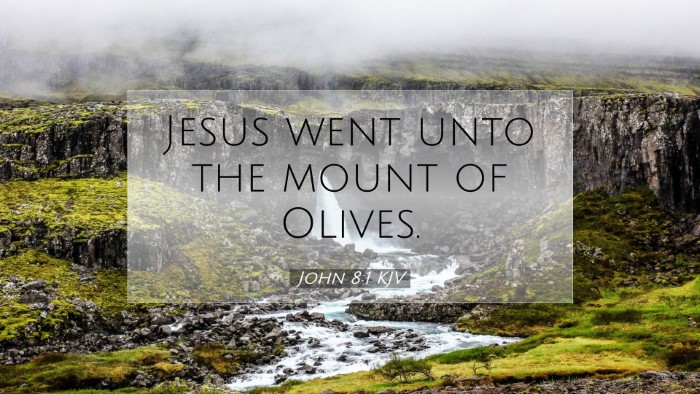Commentary on John 8:1
John 8:1 states, "But Jesus went to the Mount of Olives." This brief verse serves as a profound introduction to the events that follow and holds significant theological implications.
Context and Setting
Understanding the context of this verse is critical. The Mount of Olives is a place of refuge, prayer, and revelation in biblical times. It signifies a geographical and spiritual threshold for Jesus.
-
Matthew Henry's Commentary:
Henry emphasizes that Jesus' start at the Mount of Olives contrasts with the confidence of the temple leaders and the oppressive atmosphere in Jerusalem. The mountain symbolizes a place where Jesus often withdrew to pray and reflect, illustrating His commitment to communion with the Father even amidst rising tensions.
-
Albert Barnes' Notes:
Barnes observes that Jesus often departed to this mount for solitude and that it held considerable significance as a place for teaching. He highlights the tactical distance Jesus places from the Jewish establishments, suggesting that His ministry was not done in isolation but stood apart from the corruption and controversies of the religious leaders in the temple.
-
Adam Clarke's Commentary:
Clarke identifies the Mount of Olives as a prophetic site, referencing its connection to the end times and the eventual return of Christ. He elaborates on the geographical and historical implications of this location, signifying a place of sorrow and glory, foreshadowing the crucifixion and resurrection that would soon reveal God’s redemptive plan.
Theological Implications
This simple action of Jesus going to the Mount of Olives holds deep theological significance.
-
Retreat and Reflection:
The act of withdrawing to a solitary place underscores the importance of retreat for spiritual renewal. Theologians emphasize that even the Son of God prioritized prayer and communion with the Father. This serves as a model for believers to seek solitude amid ministry demands.
-
Foreshadowing Events:
The Mount of Olives is intrinsically tied to multiple pivotal events in Jesus' life, particularly in Gethsemane, where He faced His impending sacrifice. Understanding Jesus' actions here enriches our insight into His humanity and divine mission.
-
Contrast with Religious Authority:
Henry notes the stark contrast between Jesus' humility and the pride of the religious elite. This tension is foundational in John's Gospel, which frequently illustrates how Jesus subverts societal and religious expectations.
Applications for Pastors and Theologians
This verse invites deep reflection for pastors, students, and theologians on multiple levels:
-
Importance of Solitude:
In the busyness of ministry, the need for time apart for prayer and reflection remains paramount. Jesus' example challenges leaders today to carve out space for God and personal renewal.
-
Engagement with Culture:
The distancing from corrupt religious authorities urges modern-day Christians to discern their associations and influences. As Jesus withdrew, so should believers be vigilant of their spiritual environments.
-
Building a Theology of Place:
Examining the significance of the places Jesus frequented enriches biblical theology, demonstrating that locations often carry spiritual weight. This prompts deeper investigation into how places in the Bible affect our understanding of the narrative.
-
Encouragement in Trials:
For those facing trials or opposition, Jesus’ actions provide comfort. The Mount of Olives represents both retreat and preparation for the upcoming challenges. Believers are reminded that moments of solitude can foster strength for forthcoming battles.
Conclusion
John 8:1, while a brief statement, opens the door to a wealth of reflection and insight. By analyzing it through various commentaries and theological lenses, we can appreciate the layers of meaning present in Jesus’ actions. It compels pastors, theologians, and students to seek deeper communion with God, recognize the importance of spiritual preparation, and navigate the complexities of ministry with the wisdom exemplified by Christ.


